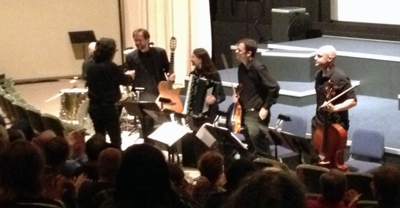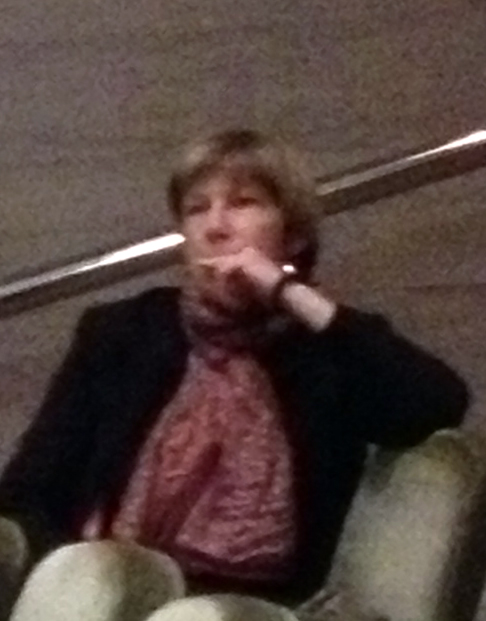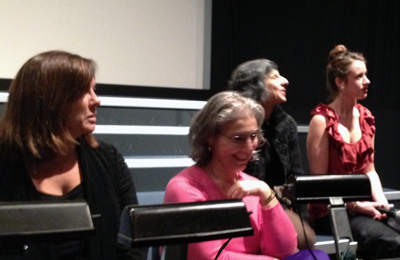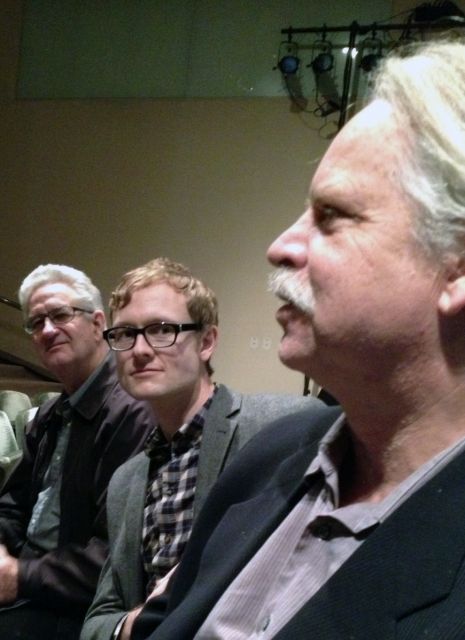 Kim Allen Kluge conducting
Kim Allen Kluge conducting
Alice Guy Blaché, Transatlantic Sites of Cinema Nouveau, 1896-1920, was a three day event sponsored by the University of Maryland, the French Embassy in Washington DC, and the National Gallery.
 UMD Professor Caroline Eades, Producer of the Event
UMD Professor Caroline Eades, Producer of the Event
Two of the three events were screenings of Alice Guy's films on a big screen with live music. This is how silent films should be seen, folks. I've been looking at, and studying, Alice Guy's films for twenty years now, but every time I seem them on a big screen I learn something new. And when I see these films with music, live music played with a empathy for the film, I not only learn more, I feel the films more. The Transatlantic Sites of Cinema event had two such marvelous events.
The first day was a Cine-Concert of short films by Alice Guy Blaché with musical accompaniment by pianist Burnett Thompson at La Maison Française (French Embassy)-
The Films shown were
- Sage-femme de première classe (First Class Midwife) 1902 (3:29)
-"New Love For Old", 1912 (4:50)
-"Falling Leaves", 1912 (12:00)
-"Roads Lead Home", 1913 (16:36)
-Matelas Alcoolique (Drunken Mattress) 1906 (10:10)
 Alison McMahan, Prof. Isabelle Gournay, Kim Tomadjoglou, and Kathryn Vassar Kluge
Alison McMahan, Prof. Isabelle Gournay, Kim Tomadjoglou, and Kathryn Vassar Kluge
On Saturday, November 10th, there was a Cine-concert at the National Gallery with live musical accompaniment by Kim and Kathryn Kluge. The films shown were:
-The Sieurin Collection (1899–1900)
-Five O'Clock Tea (1905)
-Falling Leaves (1912)
-Greater Love Hath No Man (1911)
-Mixed Pets (1911)
-Alice Guy tourne une phonoscène (1905)
-The Ocean Waif (1916)
-Parson Sue (1912) (newly discovered film and new preservation).
The Kluges assembled a stellar group of musicians to premiere their work: Jeffry Newberger on the violin, Benjamin Wensel on the cello, Joan Grauman on the accordion, Srdjan Kolarevic on the guitar, Joe Connell on percussion, and Kathryn Vassar Kluge and Kim Allen Kluge on 'Ghost Piano.' Kim Allen Kluge conducted.
It was an amazing performance. The music lent something to the images, the images lent something to the music. For the first time, watching Greater Love Hath No Man, I realized that Romaine Fielding, who plays the unrequited lover, also plays a talkative goldminer in a blond beard who keeps interrupting the lover's desire for some alone time. (By the way, David Lindblom, a filmmaker in New Mexico, promises that his documentary on Romaine Fielding, No Star for Romaine, will be ready in 2013).
 and Elizabeth Papadazian(R).jpg) Kathryn and Kim Kluge, Prof. Elizabeth Papadazian, event organizer
Kathryn and Kim Kluge, Prof. Elizabeth Papadazian, event organizer
But what is this 'Ghost Piano' referred to in the description? I let the composers explain it themselves, per the composer's statement from the program:
In writing the musical score to the films of Alice Guy Blache, husband and wife composing team Kim Allen Kluge and Kathryn Vassar Kluge have been inspired not only by Guy's extraordinary images, but also by the remarkable qualities of this creative and experimental director/producer.
Alice Guy was a visionary, an innovator and a pioneering lady of film. Perhaps what distinguishes her most is her sense of play within her medium of illusion. She played with visual, sound, and narrative techniques that were revolutionary for her time—and always with the intent to entertain. In keeping with Guy's approach to her films, the Kluges play with their medium of sound, creating a conversation between past and present in a playful and inventive manner wholly informed by Guy's vision and spirit.
Watching these films of Alice Guy Blache's, one almost feels as if you can see the twinkle in the eye behind the camera. To compliment her aesthetic, the Kluges have developed a novel approach to their musical score that they hope will delight and surprise.
The 'ghost piano' was pre-recorded piano melodies that would drift in and out from behind the screen, ditties of the type that might have been heard in 1906 or 1910, that interacted and counterpointed the live music being played. Having the music emanate from behind the screen definitely added to a ghostly feeling. From the discussion afterward it was clear that many in the packed house felt what I did, that the piano music came from the past, as the films did, and conversed with the music written in more contemporary idioms tha was being played live.
It was an amazing experience. I can only hope the Kluges and their gifted musicians get to repeat this performance over and over again.
It was a real pleasure to watch Parson Sue for the first time, thanks to the preservations efforts of Kim Tomadjoglou and ColorLab and the generosity of Larry Benaquist.
The film stars Blanche Cornwall as the female parson who tries to bring some civility to a gold mining camp. Billy Quirk (in his first role for Solax) plays a trickster goldminer who quickly notices that his fellow miner, played by Darwin Karr, has fallen hard for the parson. But so a slick gambling type, who swears revenge when she rejects his advances. Billy and his friends play a joke on Karr, sending him a note purportedly from the Parson begging him to come and visit her in the evening. Karr shows up, ready for romance, just as the slick cardplayer comes in with a group of bandits ready for a gang-bang. The jokes on the gambler, though, as Karr and his friends, who were all set to watch Karr get humiliated, instead rout the gambler and the bandits. Karr suffers a broken arm and other injuries but the Parson willingly nurses him back to health while his friends look on approvingly.
Alice Guy would use the trope of a prank being planned against a hapless admirer for the benefit of an audience of friends again in Officer Henderson. This time it's Billy Quirck playing a policeman in drag who plans to let a masher come on to him in a restaurant for the benefit of his fellow policemen. Quirck ends up missing his assignation because his wife has put on the dress (a dress he needed to catch purse snatchers) and unwittingly keeps her husband's appointment. When the masher accosts her she has no trouble whaling him with her handbag, much to the delight of the watching policemen.
 Professors Rick Altman, Brian Jacobson, and Charlie Musser.
Professors Rick Altman, Brian Jacobson, and Charlie Musser.
The performance concluded with a discussion with all of the scholars who presented at the symposium the day before, the musicians, and the composers.